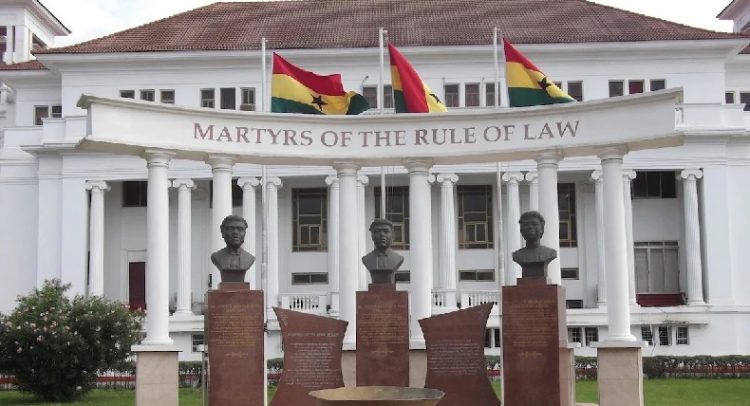The Supreme Court has dismissed an objection by Tsatsu Tsikata for Justice Clemence Honyenuga to recuse himself from a case before the court seeking to overturn an injunction against the gazetting of John Peter Amewu as MP-elect of Hohoe Constituency.
A 5-member panel of the court presided over by Justice Yaw Appau dismissed the application for lacking merit.
The court was set to hear the case but Mr. Tsikata who is lawyer for the applicants who secured the injunction against Mr. Amewu before a Ho high Court raised an objection to Justice Honyenuga being a member of the panel.
The lawyer had argued that Justice Honyenuga was a close friend of Mr. Amewu hence could be bias in the determination of the case before the court.
He added that there are witnesses who were willing to testify to the fact that the judge and the MP-elect have a close relationship.
The objection was opposed by Deputy Attorney General, Godfred Yeboah Dame who stated that Mr. Tsikata has a duty to establish the case of bias against the said judge but has not done so, and that the claims are only premised on “speculative and conjecture.”
The 5-member panel presided over by Justice Yaw Appau and assisted by Justices Samuel K Marful-Sau, Honyenuga , Gertrude Torkornoo and Amadu Tanko overruled the objection as having not merit.
The court held that an allegation of bias against a judge is a serious case which must be backed with “irresistible evidence.”
Injunction Case
The Attorney General’s Department has filed a suit at the Supreme Court challenging the decision of a High Court in Ho to prohibit the Electoral Commission (EC) from gazetting John Peter Amewu as the winner of the Parliamentary election in the Hohoe Constituency.
The suit, filed by the Deputy Attorney General, Godfred Yeboah Dame, argues that the orders of the court presided over by Justice George Buadi constitute a “flagrant abuse of the process of the court”.
The suit argues that the High Court has no jurisdiction under Article 33 of the Constitution and Order 67 of the High Court (Civil Procedure) Rules, 2004, C. I. 47 to consider, determine or grant remedies in a matter of the nature of a parliamentary election petition, constitutionally required to be instituted under Article 99 of the Constitution and Section 16 of Representation of the People’s Law, 1992 (PNDCL 284).
It is the case of the AG’s Department that “the deployment of the human rights jurisdiction of the High Court in a matter substantially attacking the validity of the election of a person as a Member of Parliament constituted a fundamental constitutional error and, rendered the proceedings at the court below void and a nullity.”
Again, the AG argues that the relevant facts of the case of the plaintiff in the case at the Ho High Court which they are undoubtedly aware of, show that the traditional areas of Santrokofi, Akpafu, Likpe and Lolobi form part of the Oti Region, and not the Volta Region, having been so created by C.I. 112 enacted pursuant to the completion of the processes for the creation of new regions set out in article 5 of the Constitution.
BY Gibril Abdul Razak


